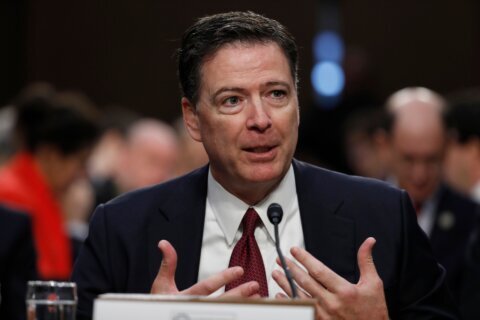WASHINGTON — The Nixon White House, particularly its misdeeds, may seem to have been exhaustively documented. But even Washington Post journalist Bob Woodward, who with Carl Bernstein did so much to bring the president down in the wake of the Watergate scandal, found new facts.
A few years ago, Woodward met for the first time Alexander Butterfield, a Nixon aide whose office was next door to the Oval Office for three years and was the first to reveal that conversations in the Oval Office were taped.
Butterfield is 89 now, Woodward tells WTOP’s Mark Lewis, and “has a fabulous memory.” Even better, though, he had about 20 boxes of documents in his California home, including “a lot of new material that I had never seen that’s not in any of the books or the articles,” Woodward says. “To be honest, I was shocked at some of them.”
The results can be found in Woodward’s new book, “The Last of the President’s Men,” and the most shocking revelation for Woodward was the cynicism with which Nixon managed the Vietnam War — a conflict Woodward says “still casts a shadow over this country.”
In one memo from Nixon to National Security Advisor Henry Kissinger, the president sums up years of bombing in Southeast Asia as “Result = Zilch.” For three years before that, Nixon had ordered almost 3 million tons of bombs dropped on Vietnam, Cambodia and Laos. Worse yet, another million tons were dropped afterward.
Connecting the information with that found on other tapes and documents, Woodward says, the prosecution of the war “was driven in large part so Nixon would be re-elected. … It turns history on its head.”
He adds, “I’m sure Nixon, in fairness, wanted to win the war. But you connect all this up and you realize the war was lost, and he continued it. And he cites polls to Kissinger [regarding] the popularity of the bombing. … One of the most sacred trusts a president, as commander-in-chief has, [was used] in large part for political purposes.”
It seems hard to believe that Butterfield could simply walk out of the White House with such a treasure trove of sensitive documents, but Woodward says that Butterfield’s very job — he controlled the flow of documents, memos, briefing papers and correspondence to Nixon — put him in position to pull it off.
“He was the one in charge of preventing others from taking documents,” Woodward says. “The cop is always the one who can commit the crime.” He and his wife simply backed their cars up to the White House and loaded them up.
Nixon has been out of office for more than 40 years, and has been dead for more than 20, but we can still draw lessons from his administration and how the country reacted to it, Woodward says, particularly in this election year: The vetting of presidential candidates, he says, is not sufficient: “It’s poll-driven; it’s people giving their emotional reactions or their gut reactions, and a lot of conclusions, and not enough hard evidence to really say ‘This is who Donald Trump is’ … ‘this is who Hillary Clinton is’ … This book is about Nixon, but in many ways it’s a warning: God help us, let’s hope we do not get another Nixon or anybody with these tendencies toward secrecy and criminality. …
“The public persona [Nixon] presented was false. In private, he was raging and plotting and obsessed with slights, obsessed with the Kennedys — it’s a very ugly story.”
The key, he says, is to find out the kind of information that tells voters who the candidates really are — where they’ve come from, what kind of mistakes they’ve made and how they’ve bounced back. “And I think that’s the responsibility of those of us in the media.”








